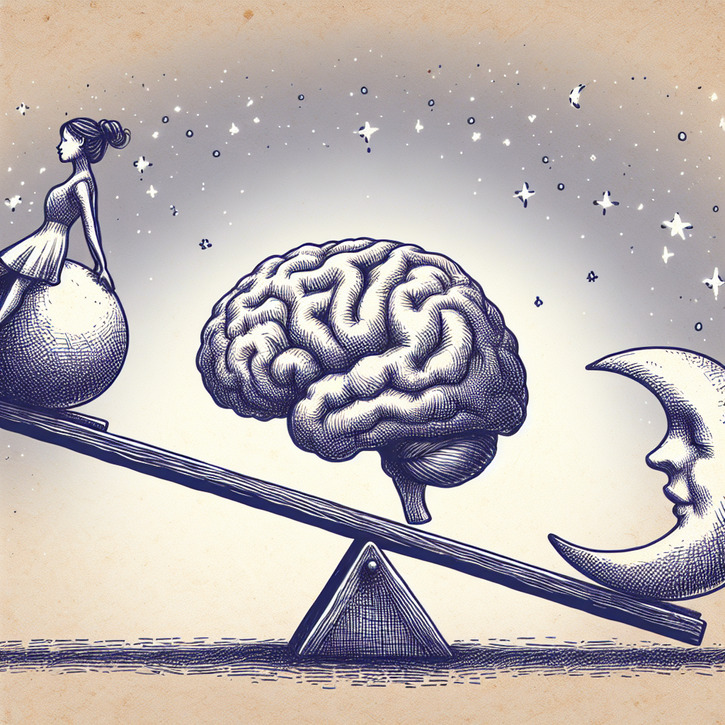The Link Between Mental Health and Sleep Issues: How to Achieve Balanced Well-being

Introduction: Recognizing Sleep Issues and Their Impact on Mental Health
These days, it feels like sleep problems have taken over our lives. Whether it’s tossing and turning all night, dealing with insomnia, or even experiencing conditions like hypersomnia and sleep apnea, these issues shake up our natural sleep patterns and mess with our mental health. We all know that a bad night’s sleep doesn’t just ruin your energy during the day—it also clouds your mood, muddles your thoughts, and can even throw off your emotional balance. In this post, we’re diving into how our sleep and mental well-being are tangled together, breaking down the science behind our sleep cycles, and sharing some really practical tips to help you get back on track.
It’s crucial to grasp how a shaky sleep routine can throw your brain and body into chaos. With our fast-paced lifestyle chock-full of work pressures and screens demanding our constant attention, poor sleep habits are almost inevitable. By drawing connections between sleep issues and mental health challenges, we hope to share insights and simple strategies that can help you fend off stress, anxiety, and depression. So, whether you’re occasionally losing sleep or facing chronic issues, think of this guide as a friendly resource to help you reclaim your nights and boost your overall health.
We’ll be unpacking the reasons behind sleep troubles, the science that drives them, and how they link with familiar mental health conditions. By setting the stage with what sleep issues look like in our modern lives, we can then embark on a meaningful conversation about how improving your sleep might just lead to a richer, healthier life. So, let’s take this journey together—unraveling the secrets of a balanced well-being, one sleep cycle at a time.
The Science of Sleep Issues: Unraveling the Brain–Sleep Connection
Have you ever wondered what really goes on between our brain and our sleep? Our bodies run on an internal clock known as the circadian rhythm, which helps manage when we feel awake and when it’s time to hit the hay. But throw in a hectic schedule, frequent travel, or constant stress, and that clock can easily get out of sync. When it does, not only is your sleep quality affected, but the delicate balance of hormones and neurotransmitters—so vital for both sleep and mental health—can be thrown off completely. This helps explain why making it to your pillow at night can seem like such a challenge, leaving you in a cycle of fatigue and mental fog.
At the center of this intricate dance are chemicals like melatonin, serotonin, and cortisol. Think of melatonin as the “goodnight” messenger that nudges your body towards sleep, while serotonin and cortisol are big players in managing your mood and stress levels. When these chemicals are out of whack due to erratic sleep schedules or external stressors, you end up caught in a loop of restless nights and groggy days. By understanding these basics, you can start tweaking your daily habits to support a natural, refreshing sleep pattern.
Recent research has made it clear that sleep and mental health are inextricably linked in a two-way street. Not only can sleep issues intensify anxiety or depression, but those very mental health struggles can further disrupt your sleep. Getting out of this cycle starts with a solid understanding of how your body works from the inside out. By combining scientific facts with real-life experiences, we can better appreciate how critical a good night’s sleep is to keeping our mental landscape clear and balanced.
Identifying Common Sleep Issues That Affect Mental Health
It’s no secret that many people face sleep troubles that can really weigh on their mental health. Take anxiety, for instance—it often shows up in the form of difficulty falling or staying asleep, with your mind racing through endless “what ifs.” Once that worry cycle sets in, it becomes a self-perpetuating loop: the fear of insomnia feeds into more anxious thoughts, which in turn make it even harder to sleep. It’s a vicious circle that can drain your energy and add extra emotional strain during the day.
Depression, too, often comes hand in hand with persistent sleep problems. For some, depression leads to sleeping too much as a form of escape, while for others, it results in a frustrating inability to get any sleep at all. Either way, these sleep irregularities can throw off the brain’s reward system, making everyday activities feel like a real uphill battle. When depression and sleep issues collide, even getting out of bed can feel daunting. Medical professionals recognize this as both a cause and an effect of poor sleep, further complicating overall mental wellness.
While anxiety and depression are the most commonly spotlighted culprits, other conditions—like post-traumatic stress disorder (PTSD) and bipolar disorder—also tend to bring along their own set of sleep challenges. Whether it’s nightmares, broken sleep cycles, or restless legs, the underlying theme remains the same: poor sleep quality deepens emotional and psychological struggles. Spotting these signs early is key to managing them effectively and ultimately restoring balance to your mental health.
Lifestyle Factors Fueling Sleep Issues
Modern life is buzzing with energy, but that same intensity can seriously disrupt our sleep. Factors like diet and exercise play huge roles here. For instance, indulging in high-sugar or highly processed foods right before bed can lead to energy spikes, followed by crashes that wreak havoc on your sleep pattern. Conversely, regular exercise helps burn off excess energy and supports your body’s natural circadian rhythm, making it easier to drift off once night falls. In short, what you eat and how you move throughout the day directly affects your ability to catch quality ZZZs, with a knock-on effect on your mental well-being.
Then there’s the daily grind—all those stressors from work, family, and unexpected life twists—that can leave your body in a state of alertness when you’re trying to relax. The resulting physiological responses, like an elevated heart rate or surges of adrenaline, make it tough to wind down. And sometimes, environmental factors like too much noise, harsh lighting, or a room that’s not quite the right temperature add insult to injury. This combination of stress and external distractions makes it all too easy to lose that sweet spot of a consistent sleep schedule, leaving you feeling groggy and irritable come morning.
And of course, we can’t ignore technology’s part in this drama. With smartphones, tablets, and laptops often looming over our bedtime routines, the blue light these devices emit can seriously mess with melatonin production—our natural sleep signal. While these tech habits are almost second nature in today’s digital age, being aware of how they affect your sleep can help you break the cycle of restless nights and lingering mental stress. A few mindful changes in your daily routine may go a long way towards nurturing better sleep health.
Effective Strategies for Managing Sleep Issues
We all know that changing long-standing habits can feel like climbing a mountain, but there are some tried-and-true strategies that can really lighten the load when it comes to sleep issues. One standout method is cognitive behavioral therapy for insomnia (CBT-I). This approach helps you identify and challenge the negative thoughts and behaviors that keep you wide awake, replacing them with healthier routines that promote relaxation and sound sleep practices. Whether anxiety is keeping you up at night or your sleep cycle is just off-kilter, CBT-I offers a structured, practical plan that many have found life-changing.
Another gem in the toolkit is incorporating mindfulness and relaxation techniques into your daily routine. Simple practices like deep breathing, progressive muscle relaxation, or even a few minutes of meditation can lower your stress levels and ease you into a state of calm. These small, mindful exercises help bridge the gap between a busy mind and a relaxed body, ultimately smoothing the transition into sleep. Even if you’re new to these methods, starting with just a short period of mindful stretching or meditation before bed can make a noticeable difference in how quickly you drift off.
Establishing a soothing bedtime routine at home is also a big win. Think of your bedroom as a sanctuary—a dark, quiet, cool haven where the outside world fades away. Creating nightly rituals, like dimming the lights, reading a book, or playing some calming tunes, sends a clear signal to your brain that it’s time to wind down. These small changes can gradually add up, leading to significant improvements in your sleep quality over time.
When to Seek Professional Help for Severe Sleep Issues
Sometimes, despite your best efforts, sleep troubles just won’t quit and start to seriously impact your day-to-day life and mental health. It’s important to know when it might be time to reach out for extra help. If you’re battling chronic insomnia, spending too much time oversleeping, or waking up frequently, and you notice accompanying symptoms like heightened anxiety or deepening depression, it might be time for a professional opinion. Medical professionals or sleep specialists can offer tailored diagnostic and treatment options that align with your specific challenges.
Professional intervention could mean undergoing a detailed sleep study, trying out new medications, or exploring targeted therapies aimed at resetting your sleep cycle. Cognitive behavioral therapy continues to be a top recommendation here because it not only tackles the sleep issues but also addresses the underlying psychological factors. In many cases, experts may also suggest lifestyle adjustments alongside these medical treatments. Seeing a professional isn’t about admitting defeat—it’s a proactive step towards reclaiming control over your sleep and overall well-being.
Recognizing when your sleep issues have hit a critical point can empower you to seek the right support fast. Acknowledging that your struggles are more than just a passing phase might open the door to a comprehensive care plan addressing both your mental and physical health. By consulting with healthcare providers, you’re not only validating your experience, but also setting up a roadmap that can guide you towards better sleep and a more balanced life.
Conclusion: Embracing a Future Free from Chronic Sleep Issues
As we wrap up this discussion, it’s clear that the interplay between sleep and mental health is a complex and deeply personal journey. There's no doubt that sleep issues can wreak havoc on your mood, cognitive function, and overall vitality. But the good news is, with mindful lifestyle choices, some effective therapeutic strategies, and when necessary, professional guidance, you can turn things around and set a course for more peaceful, rejuvenating nights.
Every step you take—whether it’s tweaking your diet, dabbling in relaxation techniques, or seeking tailored professional help—is an investment in a brighter, healthier future. Better sleep isn’t just about avoiding groggy days; it’s about laying a strong foundation for your mental and physical health. We hope the insights and tips shared here inspire you to view your sleep as that essential pillar of well-being that deserves your attention and care.
So, moving forward, think of this guide as a friendly companion on your journey to better sleep. Celebrate small wins, keep tabs on your progress, and be patient with yourself as you adjust your routines. Whether your sleep issues are minor hiccups or a major battle, know that every proactive step you take brings you closer to more restful nights and brighter mornings. Remember—you’re not alone in this, and many have successfully transformed their sleep struggles into stepping stones toward lasting well-being.






